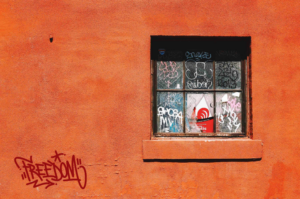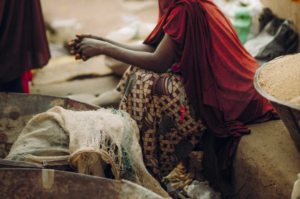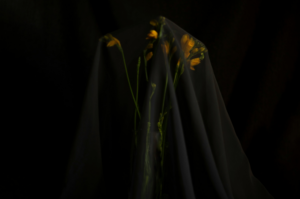
Irritated by our presence, the guard swatted us off the entrance gate with his baton, his face ugly with anger. A certain canteen beside the black gate, Makeshift, first gave us accommodation before its owner evicted us. Mama-Put, behind five large coolers placed on a table, stood dishing out nutrition: white spaghetti, whiter rice, brown beans, yellow, fried plantain, then a pot of stew—custodian to an entire tribe of meats. We had filled up the entire stall, usurping the space for her customers, until she protested. We milled towards the gate, leaning, standing, squatting all around it. The Guard kicked, literally, with his boots. And struck with his baton, administering violence on a harmless crowd. Maybe there was a background to his anger besides our presence—personal troubles, life itself, or even his boots—given the sheer force of its performance. There should be sufficient frustration in having to heave oneself around in a fake monstrosity for boots, in spending oneself on a hard, empty livelihood. We could cut him some slack, but life was hard, and we were yet to figure out our own shit.
“Bodi don de pepper you already this early morning. We no dey look Uche face,” said someone in the crowd, who had been struck by the baton.
The baton went furious with that provocation and a stampede ensued. Only then did we notice the white jeep that had been hooting. The Guard had to clear the nuisance preventing that executive entry. The MD of Doha Foods should not have his time wasted by the unruliness of job seekers.
The jeep summoned The Guard inside with a single hoot. Executive instruction. “MD say make una go. No work. He no wan see anybodi for here. Make una go!” he bawled at us, chortling in sadistic satisfaction. “Ewa-agoyin!” he called out, to a passer-by hawking local bread and beans. She came and he helped her set the tray down from her head.
“I no wan’ beans. Only Agege bread and Bama. Them no gree pay person salary.”
Her knife parted the bread, scraped Bama from a bowl on the tray, and plastered the local butter onto the inner walls of the loaf. Money exchanged hands and he squeezed the loaf within his huge palms holding out an edge—that slightly burnt part, which soon became a morsel. “Make una go!” he barked with a mouthful. A middle-aged plump fellow of average height, The Guard remained ugly only because he had rendered himself incapable of a genuine smile. He gave this impression of a failed individual. He was bald, and had attempted a seamless shave to give his head that hairless sheen. Even at that he failed, for the geography of the baldness maintained a mischievous independence.
The instruction was ignored. Doha Foods advertised for factory workers. I saw the advert myself. It was scrawled with chalk on the parapet, on the median of Oshodi-Apapa Expressway, Lagos. I saw it also at Toyota Bus Stop, very close to the Lebanese company. So what were they talking about? “Na their way,” blurted the job seeker who threw that initial jab at The Guard. A slim young man with a well-hewn Afro, his black T-shirt had a bold, white inscription front-and-back: Fear Woman. I found his expressiveness interesting. More interesting was that inscription that looked deliberate in its prominence, compressing perhaps the man’s fuller story into a famous teaser.
We were a crowd of forlorn faces. Without a livelihood, without a voice. I was there for the first time, and was surprised that the crude advert had drawn such a massive audience. The crowd broke into small, whispering clusters, refusing to disperse. There must be some hope attached to that waiting. I approached Fear Woman for a conversation.
“Ah, that advert dey there since na. Advert or no advert, we dey here every morning. If you get luck, them go employ you. If you no get luck, and you no know person inside, you go bribe your way in. Otherwise sorry na your name.”
“So how much is the bribe and who’s collecting it?”
He gave me a long side eye and walked away. Just then, the crowd suddenly gravitated towards the gate. “Oga don come!” they muttered. A short man wearing the company’s vest was about to address us. His mere presence exacted silence from the unruly crowd, his divinity self-evident. Oga was to choose the day’s workers. He reeled out seventeen names and walked away, and the chosen ones went with him. The crowd waited, still.
Shortly, a young lady appeared with a sheet of paper. “Write your name and phone number. We’ll call you.” Another stampede over name-writing and soon the sheet was torn.
“That is your problem. You have torn the paper. I wanted to help you but you can’t even help yourself—”
“Woman no fit help me!” interrupted Fear Woman.
Lady turned around looking over our heads, shook her head and walked away. The crowd turned against Fear Woman. “You too dey show yourself!” Rancour. Lady came back with another sheet of paper, handed it over to The Guard, whispered something and left.
“Shey you dey find who dey collect bribe? Go meet am, write your name,” Fear Woman shouted at my direction, drawing eyes to me. I was to learn that the whole thing that had played out was a daily routine. The names and numbers written were the links to bribery and employment. I wrote two names, and my number behind each:
19. Job Seeker.
20. Fear Woman.
For each name, a bribe of two thousand Naira was demanded, valid for a month. The Lebanese company hired us at one thousand Naira per day, payable at the end of every two weeks. It was not clear if the bribe money went to the company.
Next day: same venue, same situation. Fear Woman was wearing another T-Shirt with the same nonsense written on it. My curiosity went wild: just what feminine encounter could have birthed this phobia for women—this desperation to strike an unwholesome message into global consciousness? The man carried his story upon his back, upon his breasts. Two words, a thousand curiosities.
Soon, Oga was out to play his part as usual. “Job Seeker!”—and I went forward. He pronounced it as “Job,” the Biblical figure. “Fear Woman!”—and the crowd cheered, hailing the surprised fellow. Oga smiled. Fear Woman smiled and came forward, happy, it seemed, that his anti-femininity had found official recognition.
We were ushered into a reception hall and asked to write our names in a register. Oga took the register into his office and returned with numbered tags. We were to be called by our assigned numbers. No more names. Names evoked humanity; numbers didn’t. Humanity had no place in the scheme of objectified labour. A Lebanese man who had the Final Say was to inspect us for confirmation or disqualification. His criterion, it seemed, was physicality.
“That one no fit work,” he said, pointing at Fear Woman.
“No be by look Sir,” came the reply, which infuriated Final Say, much to our surprise.
“No be by look, na by what? My friend get out of here!”
We begged him, all of us in the reception.
“If he wan’ work, make them put am for Oven. Na there we go know.”
The company produced snacks, biscuits, and other packaged food products. Fear Woman was slim, tall, but he had this energy all about him. He alone still had his voice despite lack. He had refused to give bribes all the while that he had been coming for a job at Doha. He perhaps thought his daily T-Shirt prank helped him in. Nevertheless he had my respect for his principle and self-expression.
Final Say left and one man came, a supervisor. He was to assign us to departments. I begged him to let me work at the Oven. His brows nearly reached the back of his head. No one ever wished to work there. I wanted to work with Fear Woman, to develop a friendship and listen to his story. I was always attracted to purposeful rebellion. Besides, there was this aura about him, an electricity in spite of an internal darkness. The impressive height, the luxuriant hair carved as if by digital art. Long, slim fingers ending in well-pared nails. His goatee was long, so long he could spread it upwards over his lips and use it to filter essence from a local brew. A tiny line of hair connected the Afro to the goatee, giving his facial architecture a fine ring of unity. Never mind a skin lacking vitality, dry and rough from poverty, Fear Woman was a handsome rascal.
Working with him at the Oven brought significant bonding, but not trust. We talked about President Buhari, about the Nigeria Labour Congress, and the social media. I asked him if he had heard about the revenge porn trending on the social media about a beauty queen.
“Don’t talk to me about women!” he riled, his mood foul, shutting down violently the prospect of having a conversation about his women-phobia fashion stunts. I would soon get him to talk about it, I promised myself.
The Oven performed its notorious name. Its heat burned into the skin, leaving internal organs probably parboiled. Sited at the back of the office block at Doha’s premises, its chimney rose higher than the crown of most buildings around, like the control tower of an airport. It was the only sign of industrial presence at Mushin Street, a location chosen for its obscurity from agency and government surveillance. Mushin Street was a dusty slum, a fertile haven for cheap, low-hanging labour for criminal Lebanese plucking.
There was the sweating around the Oven; the 14-hour work schedule demanding continual standing, with only a 30-minute break time; the unending task of keeping snacks in line as they journeyed on the conveyor system. The machines were overdue for repairs, hence the irregular snack behaviour warranting manual aid, but the company chose cheap labour over higher industrial spending. And no matter how industrious, even five labourers could not have been sufficient. Just one day at the Oven and we had to go beg Final Say for redeployment.
“So who go work there, me?”
“You fit let some others come work there too Sir. Like, rotation,” said Fear Woman.
“Look, if you no wan work, comot for here. Workers full for gate. I talk am say this one wey long like bamboo no go fit work.”
We made to leave.
“Ok, ok, two hundred Naira off your daily pay and I go put you for Mixer. Take it or leave it.”
A huge pile of meat with skeletal support, Final Say. His hairless head was a bad cone, so his facial fat had to fall ponderously upon his jaw. A large nose took too much space for no reason, and his eyes, tiny like a rabbit’s, had to endure apparent territorial encroachment inside a hollow wrought by a thick nasal spine. But did he have to tuck in his shirt always, letting his massive stomach project its entire proportions? His belly revealed even the depression that was his navel. Final Say always wore knickers and sneakers, and owned sturdy legs that were buried in fur.
Third day, Mixer. No difference, only the absence of industrial heat. This time the heat came from our own physical exertion. Bare-chested in body ventilation, our sweats formed part of the input for snack production. Thirty mixers, ten labourers. Labourers scooping cream with bowls from a far-away base to feed the process of biscuit manufacture. Using bare hands to guide truant cream into vibrating machinery. The water for the mixing was slightly brown. There was the light smell of waste flour, which had formed accretions on the floor. In this section, filth was so elaborate as though it were necessary requirement for confectionery. It was shocking that Doha Foods, Nigeria’s foremost producer of packaged food products, was running on gross decay.
After the day’s labour, I walked to the bus stop with Fear Woman.
“We have to report this to NAFDAC. This is plain evil! So this is how these costly food products dancing on fancy Lagos shelves came to be, huh?”
“The thing shock me. Shey NAFDAC no fit come unannounced and see wetin dey happen? This country!”
I saw the fire in his eyes. The enthusiasm for public good, if not for vengeance against foreign exploitation. He spoke sparingly, was easily aggravated, and carried venom in his bitterness. Too much talk and I could lose his cooperation. We resolved to report the matter to NAFDAC, Nigeria’s primary agency for the regulation of food products, and to the NLC, the nation’s apex Labour body. He would create an anonymous email address; I would draft a ‘constructive report’ detailing the level of physical and official corruption going on. We would resume very early the next day to meet, cross-check facts, and execute the whistle-blowing, using our phones and the anonymous mail address. A perfect plot.
Next day, we were punctual, bubbling with secret activism. Mission accomplished. Work.
It was only a matter of minutes before Final Say’s voice tore through the air, bringing activities at every section of the factory to a halt.
“Stop work! All of you! Saboteurs! Fools! We give you chance to earn a living! We treat you fine! Yet you stab us in the back! Who among send mail to NAFDAC this morning? Report yourself! Don’t let me find out by myself else you will be in soup! Report yourself now and we will pardon you! Don’t think NAFDAC will support you! Don’t think the Nigeria police will support you! Don’t think NLC will support you! They all called us by theirself this morning saying someone here reported! Come out and confess or else you will be in hot soup if I find out by myself!”
His voice went higher with every sentence, furious veins worming menacingly at his temples. By now we had all gathered around the Mixer section, everyone. Enslaved humanity reduced to a collective robotic silence. Frightened, even apologetic in innocence. Final Say paced back and forth, repeating his threats ad-nauseam, red with rage. He was going to confiscate all phones and screen out the sabotage. He was going to call in the police on the allegation of ‘missing flour.’ He was going to show us that, even as a stranger, he had privileges over us. We had reached the bottom of humiliation. Some labourers began to exhibit their Stockholm Syndrome:
“Person wey do am make e talk o. My hand no dey.”
“Make una no come spoil person work for here. The NAFDAC wey them report give, shey them go give person work?”
“If na to swear I go swear. Me I no say I no talk anything.”
“Oga, anyhow wey you wan take do am, I ready. Even if na juju.”
It was depressing listening to the timidity of fellow labourers—their cowardice in innocence, their willingness to salute their oppression. They stood unmoving, allowing another man’s defecation to drop on their heads with leisurely thuds. A foreigner even!
Mortuary silence. Final Say was beginning to lose awe in the hollowness of repeated threats. Just then, Fear Woman left the scene, headed towards the changing booth, drawing all attention to himself.
“And where do you think you’re going?”
He ignored Final Say. Quickly he changed clothing, came back to the gathering holding his tag and the sweat-drenched jeans that had just left his body. He walked up to Final Say, who now looked cowed; he stood facing him, and cast the jeans together with the tag at his trembling Lebanese feet. And spat.
“Fuck you and your job! Fuck your entire generation! You come to my country to run a slave racket because people are hungry, and you have the guts to call us out for complaining? Is this how things work in your country? I reported to NAFDAC and NLC. Your minions in those agencies leaked the information to you and you couldn’t be ashamed of yourself! I will take this up to the highest possible level. The newspapers, the Internet, everywhere! I will keep reporting until someone’s ass is whipped, until someone is deported. There must be someone up there who will be human enough not to tolerate white rodents enslaving Nigerians. Fuck you and your work!”
No one had ever heard Fear Woman speak English, so his eloquence was as shocking as his unravelling. He stormed out, leaving Final Say saturated in disgrace. It dawned on me that I had failed him, by failing to explore a teaching moment in his support. He deserved my solidarity and I just stood there and let him go so I could keep my job. My shame was great.
“Go back to work! He thinks he can do James Bond and get away with it. We shall see.”
This place is not for me, I thought. I bolted to the changing booth and dropped all association with Doha and ran outside to meet Fear Woman. Too late. He was gone. My eyes were heavy with unshed tears. I felt sad being found wanting; conniving, by my silence, to choose enslavement over dignity.
Survival. That is the ultimate alibi to button one’s lips in the face of plain evil. The excuse to enlist oneself to the side of dictatorship, discounting the humanity of others. Walking home that moment, without a job, without even a dint of hope, walking the same road taken by my man, the world felt so right. Taking myself back from Lebanese pillaging was true triumph. Triumph over fear, over insecurity and folly. A turning point in my life, engineered by a stranger who feared women.
**************
About the Author:
 Immanuel: writer, essayist, social activist. His debut novel, Under Bridge, which won the 2014 ANA National Prize for Prose, is a study text in some schools in Nigeria, including Lagos State Polytechnic. His articles have appeared in several media outlets like BellaNaija, The Nation, Premium Times, The Punch, Daily Independent, etc. He lives in Lagos, where he works as a construction artisan and a freelance writer. He dearly loves rap music and one woman.
Immanuel: writer, essayist, social activist. His debut novel, Under Bridge, which won the 2014 ANA National Prize for Prose, is a study text in some schools in Nigeria, including Lagos State Polytechnic. His articles have appeared in several media outlets like BellaNaija, The Nation, Premium Times, The Punch, Daily Independent, etc. He lives in Lagos, where he works as a construction artisan and a freelance writer. He dearly loves rap music and one woman.









Simone June 02, 2017 06:27
The stark reality of modern slavery and human devaluation in one's own fatherland.Enjoyable piece